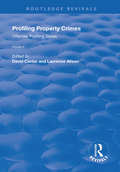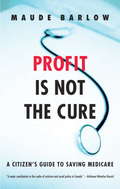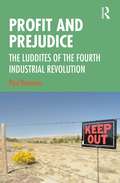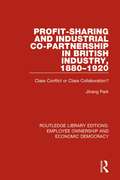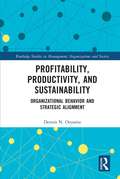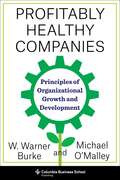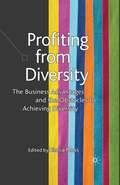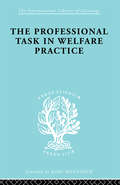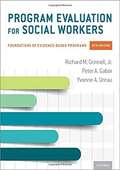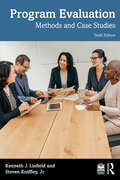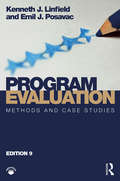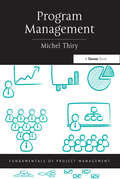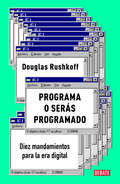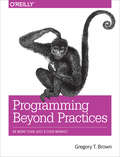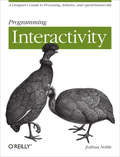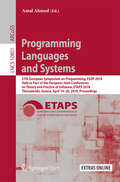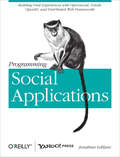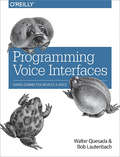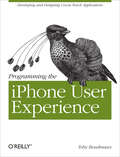- Table View
- List View
Profiling Property Crimes
by David Canter Laurence AlisonThis title was first published in 2000. Each of these commissioned papers explores the varieties of different crimes against property. The actions that differentiate types of arson, burglary, workplace crime and robbery are examined to provide insights of relevance to criminologists, psychologists and criminal investigators.
Profit Is Not the Cure
by Maude BarlowOn July 12, 1966, the Medical Care Insurance Act was passed by the federal House of Commons after a ferocious public debate that pitted the vast majority of Canadians against a powerful alliance of business, insurance companies, and doctors.More than thirty years later, the same battle is being fought all over again. Only now, the forces opposed to medicare are more ideologically unified, more richly endowed, and tied to transnational corporations whose power exceeds that of entire countries.In Profit Is Not the Cure, Maude Barlow traces the history of medicare in Canada. She compares it with both public and private systems in other parts of the world. And she contrasts it with the brutally divisive system that exists in the United States, where forty-four million people have no medical insurance, and millions more get minimal care through profit-driven health maintenance organizations. From the point of view of most patients, the United States health-care model is a disaster. But the proponents of privatization in Canada, supported by the right-wing media and corporate lobbyists, are determined to impose American-style "reforms" on the Canadian public. Three provinces - British Columbia, Alberta, and Ontario - are moving ahead rapidly to enlarge the role of commerce in the provision of health-care services. They are introducing user fees, delisting procedures that previously were covered, and encouraging private corporations to move into areas that used to be the exclusive domain of the public system.While the prime minister and federal cabinet have paid lipservice to the principles of medicare, they have made it clear by their actions that they will do nothing to impede the destruction of those principles by the provinces. In fact, their enthusiastic support of NAFTA, and the impending Free Trade Agreement of the Americas (FTAA) and General Agreement on Trade in Services (GATS), has made the defence of medicare increasingly difficult. Canadians overwhelmingly support medicare. Many, however, have been persuaded that it is a luxury we can no longer afford. Maude Barlow argues that this proposition is wrong. An earlier generation fought a bitter battle to bring medicare into existence. Another battle must be fought now to save it. But we owe it to the founders of the system, as well as to future generations, to take up the cause again. This important book shows the way.From the Hardcover edition.
Profit and Gift in the Digital Economy
by Dave Elder-VassOur economy is neither overwhelmingly capitalist, as Marxist political economists argue, nor overwhelmingly a market economy, as mainstream economists assume. Both approaches ignore vast swathes of the economy, including the gift, collaborative and hybrid forms that coexist with more conventional capitalism in the new digital economy. Drawing on economic sociology, anthropology of the gift and heterodox economics, this book proposes a groundbreaking framework for analysing diverse economic systems: a political economy of practices. The framework is used to analyse Apple, Wikipedia, Google, YouTube and Facebook, showing how different complexes of appropriative practices bring about radically different economic outcomes. Innovative and topical, Profit and Gift in the Digital Economy focusses on an area of rapid social change while developing a theoretically and politically radical framework that will be of continuing long-term relevance. It will appeal to students, activists and academics in the social sciences.
Profit and Prejudice: The Luddites of the Fourth Industrial Revolution
by Paul DonovanAvoiding prejudice will be critical to economic success in the fourth industrial revolution. It is not the new and innovative technology that will matter in the next decade, but what we do with it. Using technology properly, with diverse decision making, is the difference between success and failure in a changing world. This will require putting the right person in the right job at the right time. Prejudice stops that happening. Profit and Prejudice takes us through the relationship between economic success and prejudice in labour markets. It starts with the major changes that occur in periods of economic upheaval. These changes tend to be unpopular and complex – and complexity encourages people to turn to the simplistic arguments of ‘scapegoat economics’ and prejudice. Some of the changes of the fourth industrial revolution will help fight prejudice, but some will make it far worse. The more prejudice there is, the harder it will be for companies and countries to profit from the changes ahead. Profit is not the main argument against prejudice, but can certainly help fight it. This book tells a story of the damage that prejudice can do. Using economics without jargon, students, investors and the public will be able to follow the narrative and see how prejudice can be opposed. Prejudice is bad for business and the economy. Profit and Prejudice explains why.
Profit over Privacy: How Surveillance Advertising Conquered the Internet
by Matthew CrainA deep dive into the political roots of advertising on the internet The contemporary internet&’s de facto business model is one of surveillance. Browser cookies follow us around the web, Amazon targets us with eerily prescient ads, Facebook and Google read our messages and analyze our patterns, and apps record our every move. In Profit over Privacy, Matthew Crain gives internet surveillance a much-needed origin story by chronicling the development of its most important historical catalyst: web advertising.The first institutional and political history of internet advertising, Profit over Privacy uses the 1990s as its backdrop to show how the massive data-collection infrastructure that undergirds the internet today is the result of twenty-five years of technical and political economic engineering. Crain considers the social causes and consequences of the internet&’s rapid embrace of consumer monitoring, detailing how advertisers and marketers adapted to the existential threat of the internet and marshaled venture capital to develop the now-ubiquitous business model called &“surveillance advertising.&” He draws on a range of primary resources from government, industry, and the press and highlights the political roots of internet advertising to underscore the necessity of political solutions to reign in unaccountable commercial surveillance.The dominant business model on the internet, surveillance advertising is the result of political choices—not the inevitable march of technology. Unlike many other countries, the United States has no internet privacy law. A fascinating prehistory of internet advertising giants like Google and Facebook, Profit over Privacy argues that the internet did not have to turn out this way and that it can be remade into something better.
Profit-sharing and Industrial Co-partnership in British Industry, 1880-1920: Class Conflict or Class Collaboration? (Routledge Library Editions: Employee Ownership and Economic Democracy #6)
by Jihang ParkIn this title, first published in 1987, the author discusses the economic and industrial circumstances in Britain under which profit-sharing and co-partnership came into being. He explores the merits and drawbacks of the system as both advocates and opponents saw them, the motivations of employers in introducing profit-sharing schemes, and the implementing of such notable schemes as that of Lever Brothers, a multinational corporation based in Britain. The author also assesses the role of profit-sharing and co-partnership in the development of modern management practices and industrial relations.
Profitability, Productivity, and Sustainability: Organizational Behavior and Strategic Alignment (Routledge Studies in Management, Organizations and Society)
by Dennis N. OnyamaThis book presents an in-depth study of how the drive to optimize organizational performance can be significantly improved by investigating the causal relationships between profitability, productivity, and sustainability (PPS) through an assessment of a triple combined therapy that studies the interplay between Organizational DNA, Strategic Alignments for Value, and their implications for Sustainability. Through this approach, this volume seeks to answer critical mind-searching questions and provide useful guides as to how some firms are able to sustainably create higher value or wealth, especially through corporate entrepreneurship, or via the creation of new business models than others. In tackling the three elements of profitability, productivity, and sustainability, this book also provides greater insight through an in-depth study of the pervasively unresolved and disturbing issues surrounding the prospects of increasing the chances of success for entrepreneurial start-off ventures, making it of value to researchers, academics, and students in the fields of organizational studies, strategy, and sustainability.
Profitably Healthy Companies: Principles of Organizational Growth and Development
by Michael O'Malley Warner BurkeEvery company faces challenges, but some are able to achieve long-term vitality while others flame out. What distinguishes a healthy, high-performing organization? Which ingredients, decisions, and values result in a business that is built for the long haul?Profitably Healthy Companies lays out ten essential principles of organizational development for sustained success. Bringing together practical and academic expertise, W. Warner Burke and Michael O’Malley detail proven methods for every organization at each level. They demonstrate why a focus on employee and community well-being is more likely to ensure lasting profitability than a single-minded focus on the bottom line. Burke and O’Malley explain the keys to company resilience, examining safeguards against decline and disaster as well as tools for generative renewal and growth. They show how organizational culture encourages optimal performance, flexible and adaptive corporate strategy, and employee motivation and commitment. The book emphasizes up-to-the-moment issues, such as how to center diversity and inclusion and the promise and pitfalls of remote work.Burke and O’Malley base their recommendations on research in organizational psychology as well as their own extensive consultative experience, providing a rich array of case studies and examples. Profitably Healthy Companies is a clear and authoritative guide for practitioners, leaders, and decision makers, synthesizing an all-inclusive treatment of organizational life with a comprehensive checklist of what organizations must do in order to thrive.
Profiting from Diversity
by Gloria MossThe benefits of Diversity are frequently mentioned but rarely spellt out. This edited book highlights specific ways in which organisations can profit from Diversity, and a discussion of some of the obstacles that can stand in the way of doing this.
Profsnl Task Welf Prac Ils 188 (International Library of Sociology)
by P. NokesFirst Published in 1998. Routledge is an imprint of Taylor & Francis, an informa company.
Program Evaluation for Social Workers: Foundations of Evidence-Based Programs
by Richard M. Grinnell Yvonne A. Unrau Peter A. GaborOver the course of 20 years and eight editions, the goals of the book have remained the same: to prepare students to participate in evaluative activities within their organizations, become beginning critical producers and consumers of the professional evaluative literature, and reap the benefits of more advanced evaluation courses and texts. <p><p> The authors aim to meet these objectives by presenting a unique approach that is realistic, practical, applied, and user friendly. Unlike other textbooks on the market, Program Evaluation for Social Workers presents both program-level evaluation and case-level evaluation methods; assuming that neither of these two distinct approaches alone adequately reflects the realities of the field, the book demonstrates how they can instead complement each other. This integration of approaches provides an accessible, adaptable, and realistic framework for students and beginning practitioners to more easily grasp and implement in the real world.
Program Evaluation: A Primer for Effectiveness, Quality, and Value
by Arlene FinkThis timely, unique, and insightful book provides students and practitioners with the tools and skills needed to evaluate social and policy programs across a range of disciplines—from public health to social work to education—enabling the allocation of scarce human and financial resources to advance the health and well-being of individuals and populations. The chapters are organized according to the main tasks involved in conducting an evaluation to produce unbiased evidence of program effectiveness, quality, and value. The chapters include methods for selecting and justifying evaluation questions or hypotheses, designing evaluations, sampling participants, selecting information sources, and ensuring reliable and valid measurement. The final section of the book is focused around managing and analyzing data and transparently reporting the results in written and oral form. The book features international case studies throughout, covers quantitative, qualitative, and mixed-method approaches, and is also informed by new online methods developed during the COVID-19 pandemic. Among the book’s unique features is a focus on international standards for conducting ethical evaluations and avoiding research misconduct. Also featuring checklists, example forms, and summaries of the key ideas and topics, this very practical book is essential reading for students in the social, behavioral, and health sciences, and will be a key resource for professionals in the field.
Program Evaluation: Methods and Case Studies
by Kenneth J. Linfield Steven D. Kniffley, Jr.Now in its tenth edition, this key textbook provides a solid foundation in program evaluation, covering the main components of evaluating agencies and their programs, how best to address these components, and the procedures to follow when conducting evaluations. Different models and approaches are paired with practical techniques, such as how to plan an interview to collect qualitative data and how to use statistical analysis to report results. The newly enhanced MISSION! framework, returned to throughout the book, helps solidify the seven general areas that program evaluators must consider at all times: meeting needs, implementation, stakeholders, side effects, improvement focus, outcomes, nuances, and underpinning everything, a consideration of diversity and equity.Key features of this new edition include: Emphasis on culturally responsive approaches to evaluation, equipping students with the skills needed to foster inclusivity, social justice, and collaboration in their program evaluations A focus on real-world preparation, with a rich variety of case studies introduced into every chapter, along with videos from case study evaluators providing a vital insight into the actual practice of program evaluation Accompanied by a rich variety of instructor and student resources, including contributions from expert program evaluators, and taking a student-centred approach from the beginning, this is an essential resource for undergraduate and graduate students of program evaluation.
Program Evaluation: Methods and Case Studies (Mysearchlab Series 15% Off Ser.)
by Emil J. Posavac Kenneth J. LinfieldThis text provides a solid foundation in program evaluation, covering the main components of evaluating agencies and their programs, how best to address those components, and the procedures to follow when conducting evaluations. Different models and approaches are paired with practical techniques, such as how to plan an interview to collect qualitative data and how to use statistical analyses to report results. In every chapter, case studies provide real world examples of evaluations broken down into the main elements of program evaluation: the needs that led to the program, the implementation of program plans, the people connected to the program, unexpected side effects, the role of evaluators in improving programs, the results, and the factors behind the results. In addition, the story of one of the evaluators involved in each case study is presented to show the human side of evaluation. This new edition also offers enhanced and expanded case studies, making them a central organizing theme, and adds more international examples. New online resources for this edition include a table of evaluation models, examples of program evaluation reports, sample handouts for presentations to stakeholders, links to YouTube videos and additional annotated resources. All resources are available for download under the tab eResources at www.routledge.com/9781138103962.
Program Evaluation: Methods and Case Studies (Mysearchlab Series 15% Off Ser.)
by Emil PosavacComprehensive yet accessible, this text provides a practical introduction to the skills, attitudes, and methods required to assess the worth and value of human services offered in public and private organizations in a wide range of fields. Students are introduced to the need for such activities, the methods for carrying out evaluations, and the essential steps in organizing findings into reports. The text focuses on the work of people who are closely associated with the service to be evaluated, and is designed to help program planners, developers, and evaluators to work with program staff members who might be threatened by program evaluation.
Program Management (Fundamentals of Project Management)
by Michel ThiryProgram management (PgM) is fast developing as the essential link between strategy and projects and as a vehicle for organizational change. It offers the means to manage groups of projects with a common business purpose in an integrated and effective way. The Second Edition of Michel Thiry’s Program Management builds on the bestselling title first published in 2010. The heavily revised text reflects the latest program management guides and international standards and includes: a new section on agile management in programs; the author’s own program management maturity measure; a new section on change management, which is now integral to many programs. Michel has also reviewed and revised the program lifecycle to align with the more unified view of program management that has emerged since the book was first published. The result is an essential guide to program management that incorporates a robust theoretical framework, complemented by examples and advice from one of the world’s leading practitioners.
Programa o serás programado: Diez mandamientos para la era digital
by Douglas RushkoffDiez mandamientos para la era digital. El debate sobre si la red es buena o mala es irrelevante: la red está aquí para quedarse y si bien somos cada vez más conscientes de los muchos problemas que ha engendrado la era digital, lo que se requiere ahora es una respuesta humana a la evolución de estas tecnologías. Para Rushkoff es imprescindible empezar a codificar los cambios por los que estamos pasando y desarrollar un nuevo patrón ético, comportamental y comercial para guiarnos. Estamos viviendo un cambio de paradigma real y sin embargo tenemos escasa comprensión de lo que nos ocurre y de cómo superarlo. La verdadera pregunta que debemos plantearnos es, ¿dirigimos la tecnología, o nos dejamos dirigir por ella y aquellos que la han dominado? En el paisaje altamente programado en el que vivimos podemos crear el software o podemos ser el software; programar o ser programados. Hasta ahora, nos hemos limito a ser programados. Eneste pequeño y valioso libro Rushkoff ofrece tanto a los entusiastas cibernéticos como a los tecnófobos las pautas para navegar en este nuevo universo digital y recuperar el control de nuestras vidas.
Programming Beyond Practices: Be More Than Just a Code Monkey
by Gregory T BrownWriting code is the easy part of your work as a software developer. This practical book lets you explore the other 90%—everything from requirements discovery and rapid prototyping to business analysis and designing for maintainability. Instead of providing neatly packaged advice from on high, author Gregory Brown presents detailed examples of the many problems developers encounter, including the thought process it takes to solve them.He does this in an unusual and entertaining fashion by making you the main character in a series of chapter-length stories. As these stories progress, the examples become more complex, and your responsibilities increase. Together, these stories take you on a journey that will make you question and refine the way you think about, and work on, software projects.Steps in this unique journey include:Using prototypes to explore project ideasSpotting hidden dependencies in incremental changesIdentifying the pain points of service integrationsDeveloping a rigorous approach towards problem-solvingDesigning software from the bottom upData modeling in an imperfect worldGradual process improvement as an antidote for over-commitmentThe future of software development
Programming Interactivity: A Designer's Guide to Processing, Arduino, and Openframeworks
by Joshua NobleMake cool stuff. If you're a designer or artist without a lot of programming experience, this book will teach you to work with 2D and 3D graphics, sound, physical interaction, and electronic circuitry to create all sorts of interesting and compelling experiences -- online and off.Programming Interactivity explains programming and electrical engineering basics, and introduces three freely available tools created specifically for artists and designers:Processing, a Java-based programming language and environment for building projects on the desktop, Web, or mobile phonesArduino, a system that integrates a microcomputer prototyping board, IDE, and programming language for creating your own hardware and controlsOpenFrameworks, a coding framework simplified for designers and artists, using the powerful C++ programming languageBTW, you don't have to wait until you finish the book to actually make something. You'll get working code samples you can use right away, along with the background and technical information you need to design, program, build, and troubleshoot your own projects. The cutting edge design techniques and discussions with leading artists and designers will give you the tools and inspiration to let your imagination take flight.
Programming Languages and Systems: 27th European Symposium On Programming, Esop 2018, Held As Part Of The European Joint Conferences On Theory And Practice Of Software, Etaps 2018, Thessaloniki, Greece, April 14-20, 2018, Proceedings (Lecture Notes in Computer Science #10801)
by Amal AhmedThis open access book constitutes the proceedings of the 27th European Symposium on Programming, ESOP 2018, which took place in Thessaloniki, Greece in April 2018, held as Part of the European Joint Conferences on Theory and Practice of Software, ETAPS 2018. The 36 papers presented in this volume were carefully reviewed and selected from 114 submissions. The papers are organized in topical sections named: language design; probabilistic programming; types and effects; concurrency; security; program verification; program analysis and automated verification; session types and concurrency; concurrency and distribution; and compiler verification.
Programming Social Applications: Building Viral Experiences with OpenSocial, OAuth, OpenID, and Distributed Web Frameworks
by Jonathan LeBlancSocial networking has made one thing clear: websites and applications need to provide users with experiences tailored to their preferences. This in-depth guide shows you how to build rich social frameworks, using open source technologies and specifications. You'll learn how to create third-party applications for existing sites, build engaging social graphs, and develop products to host your own socialized experience.Programming Social Apps focuses on the OpenSocial platform, along with Apache Shindig, OAuth, OpenID, and other tools, demonstrating how they work together to help you solve practical issues. Each chapter uncovers a new layer in the construction of highly viral social applications and platforms.Learn how to build applications on top of social containers, and leverage existing user dataMap user relationships with a social graph, and extend social links between usersCustomize your application with user profile information and encourage growth through friendshipsBuild a scalable social application container with OpenSocial and ShindigDive into advanced OpenSocial topics such as templating and data pipelining methodsProtect your container and its users against malicious code
Programming Voice Interfaces
by Walter Quesada Bob LautenbachGet a step-by-step guide for developing voice interfaces for applications and devices connected to the Internet of Things. By allowing consumers to use natural human interactions, you can avoid awkward methods of input and interactivity to provide them with elevated user experiences. This practical book is ideal for software engineers who build applications for the Web, smartphones, as well as embedded systems that dominate the IoT space.Integrate voice interfaces with internet connected devices and sensorsLearn how to integrate with existing voice interfacesUnderstand when to use a voice over other Natural User Interface technologiesBuild a prototype with tools such as Raspberry Pi, solderless breadboards, jumper cables, sensors, Arduino, Visual Studio, and other toolsUse cloud services such as Azure and AWS to integrate voice with your existing or new web service end-points
Programming the iPhone User Experience: Developing and Designing Cocoa Touch Applications
by Toby BoudreauxApple's iPhone and iPod Touch not only feature the world's most powerful mobile operating system, they also usher in a new standard of human-computer interaction through gestural interfaces and multi-touch navigation. This book provides you with a hands-on, example-driven tour of UIKit, Apple's user interface toolkit, and includes common design patterns to help you create new iPhone and iPod Touch user experiences. Using Apple's Cocoa Touch framework, you'll learn how to build applications that respond in unique ways when users tap, slide, swipe, tilt, shake, or pinch the screen. Programming the iPhone User Experience is a perfect companion to Apple's Human Interface Guidelines, and provides the practical information you need to develop innovative applications for the iPhone and iPod Touch, whether you're a CTO, developer, or UI/UX designer.Understand the basics of the Cocoa Touch framework for building iPhone and iPod Touch applications Learn theory and best practices for using Cocoa Touch to develop applications with engaging and effective user interfaces Apply your knowledge of Objective-C to the iPhone/iPod Touch framework Customize standard UIKit views according to Apple's Human Interface Guidelines and usability principles Learn patterns for handling user experience concerns outside of the interface, such as network- and location-awareness
Programming with the KinectTM for Windows® Software Development Kit
by David Catuhe<p>Create rich experiences for users of Windows 7 and Windows 8 Developer Preview with this pragmatic guide to the Kinect for Windows Software Development Kit (SDK).</p>
Programming4Modeling: Codes in Modellen auf Basis von Java und UML
by Eric Aristhide NyamsiDas Buch fokussiert auf objektorientierte Softwareentwicklung in Bezug auf das Konzept „Programming4Modeling“ genannt „P4M“. Es stellt zum einen die Analyse und Design für die Modellierung mit UML und zum anderen die Softwareentwicklung mit Java dar. Das Buch wirft folgende Fragen auf: Wie ist die Architektur eines Klassenmodells? Welche Codes ermöglichen eine effiziente Softwareentwicklung? Was sind die Schnittpunkte von Codes und Modellen?
